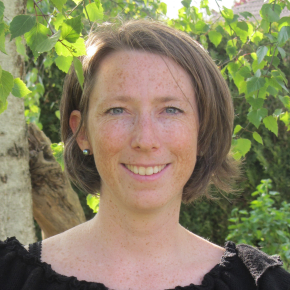Caroline West – at the top in analytical chemistry
Caroline West is a senior lecturer at the Institute of Organic and Analytical Chemistry (ICOA, CNRS/University of Orléans) and a junior member of the Institut Universitaire de France. She was recently included in The Analytical Scientist's "40 under 40 " list of the world's best analytical chemists under forty years of age.
What does being included in The Analytical Scientist's "40 under 40" list mean to you?
This news is firstly an honour but also a challenge. It means that people will be waiting to catch me out. I know more attention will be paid to my scientific production from now on.
This journal publishes a list like this every year but the themes change. In 2014, I had already been mentioned in their previous "40 under 40" list. It was important for me to be included a second time and not to have failed!
In any case, I do not see this award as just personal recognition. I remain very aware of the role of my industrial partners and the colleagues and students who work with me. At the ICOA, I am well supported and have the resources required to conduct my research.
You are a specialist in chromatography and particularly supercritical phase chromatography. What is this?
Chromatography has two objectives when working on separating molecules - an analytical approach that seeks to identify products and a preparatory approach that purifies them for another use. Supercritical phase chromatography (SFC) uses carbon dioxide that is pressurized and mixed with a solvent. This method is more multipurpose than other chromatographies and enables efficient and rapid separations. Another important aspect for me is that it is more environmentally friendly because it requires less solvents and also works with ethanol which is 'greener' than conventional hexanes or chlorinated solvents.
What are your main contributions in this area?
For the past twelve years, I have been working on classifying the hundreds of stationary phases which can be used for supercritical chromatography, i.e. the fixed support which the compounds are put onto and separated by pressurized CO2. This method can be confusing for users because many parameters change compared to more common techniques such as gas or liquid chromatography. But I try to encourage people to use it because it is very efficient.
I do not only carry out fundamental research, I have been collaborating for several years with laboratories like Servier to transfer my work to an industrial context. The time savings offered by this technique are crucial for its industrial use in addition to its cost which is reduced by its low solvent consumption. I have also set up partnerships with manufacturers of chromatography equipment to look for even more efficient and user-friendly solutions.
What is your vision of chemistry?
Chemistry is everywhere around us especially analytical chemistry. It's nice to know that it can be applied to absolutely any field and interest. During a walk in the forest, chemistry is there in the smells and if you are a sports enthusiast, it is in the fight against doping, etc. In any case, that's what I like to pass on to people at popular science events.
